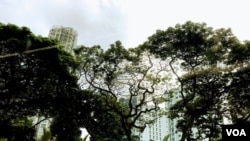The latest session of Singapore’s Parliament opened in August with something it’s never seen before: the newly created role of Leader of the Opposition.
Pritam Singh, of the Workers' Party, took the position following an election that political analysts say signaled dissatisfaction with a system long dominated by a single party.
The July general election gave the Workers’ Party four more seats for a total of 10 in Parliament, compared to 83 for the ruling People’s Action Party. The Progress Singapore Party took two seats.
While Singapore has an open society, it has been run by a single party since independence from Britain. Voters have expressed a desire for political pluralism before, but political analysts say there are signs that this time may be different.
Dennis Tan, Singh’s fellow party member in Parliament, last week said voters “embraced the need for a diversity of viewpoints,” in addition to the views of the People’s Action Party, which has largely ruled since 1965.
“I hope the ruling party can start to accept that,” Tan said.
A record high of 11 parties participated in July’s general election. The PAP won 61% of the vote, near its all-time low of 60% support in the 2011 election.
After this most recent election, Lee Hsien Loong, the prime minister of Singapore and the secretary general of the PAP, acknowledged the public’s apparent desire for more “opposition presence in Parliament."
Heading into the new term, Lee told his fellow party members to brace for vigorous debate.
“With more opposition MPs in the new parliament, and a leader of the opposition formally designated, we must expect sharper questioning and debate in Parliament,” he wrote in a letter to them.
Political analyst Joshua Kurlantzick said the election suggests a “viable” opposition may form in the Southeast Asian nation.
“In the longer term, the stage may be set for more contested politics,” Kurlantzick wrote in an analysis for the Council on Foreign Relations, where he is a senior fellow for Southeast Asia.
He predicted that weaknesses in the ruling party could create openings for other parties.
“Besides the PAP’s struggle to control COVID-19, which (might) be a shorter-term issue, the persistently high cost of living, the hard-hit Singaporean white-collar workforce, the challenges with Singapore’s existing housing model, and other deeply entrenched socioeconomic problems will continue to challenge the PAP government,” he said.
Kenneth Paul Tan, an associate professor at the Lee Kuan Yew School of Public Policy, said the Singapore election results demonstrate a wish for more debate.
“I do think that they signal interests and concerns that many voters consider to be insufficiently audible in policymaking debates,” he told VOA. “Also, the results signal broad dissatisfaction with the structural advantages and unfair tactics that the ruling party uses to secure its electoral dominance.”
The Progress Singapore Party said it would use its role as an opposition party to bring new ideas to the table.
“Over the course of the next few years, we look forward to more information and resources provided to the opposition for it to function as an effective voice and idea generator,” said Leong Mun Wai, one of two politicians who took up a seat in Parliament this session representing the Progress Singapore Party.






